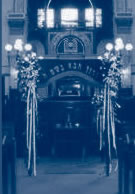|
SEDRA : Pekudei Shabbat Shekalim Hertz
Chumash p. 385 Exodus Ch. 38
This week's Sedra is generously sponsored by Lionel Meerkin.
SYNOPSIS:
At Moses' instruction the total cost of the Sanctuary was
computed. The work was inspected and approved by Moses who
invoked G-d's blessing on the people for their participation
and assistance in bringing this Holy project to a magnificent
conclusion.
On the 1st of the month Nisan - almost a year since the Exodus,
the Sanctuary was erected under Moses' personal supervision
and the contents arranged in the prescribed order. A cloud
blanketed the Sanctuary which was filled with G-d's Glory.
Whenever the cloud lifted it signalled G-d's desire for the
Israelites to continue their journey.
SPECIAL MAPHTIR SHABBAT SHEKALIM HERTZ CHUMASH P. 352
Exodus 30 verses 11 - 16
The Maphtir for Shabbat Shekalim is taken from the opening
section of the sedra "Ki Tissa". It introduces the
law for every Israelite over 20 years to make an annual contribution
of a half shekel towards the maintenance of the Temple and
its services as `atonement for his Soul'.
THE HAPHTORAH HERTZ CHUMASH P. 999 Ezechiel Ch. 36, verses
16 - 38
The theme of the haphtorah relates to the special maphtir
in that they both deal with the subject of purification. "How
Israel is to emerge from the grave of Exile, of undefiled
service of G-d".(Hertz)
TELL ME RABBI ..... MI SHE'BEIRACH A PRAYER FOR ALL OCCASIONS
The opening words of Mi She'beirach are : "He who blessed
our fathers, Abraham, Isaac and Jacob, may He bless ..."
What follows depends on the occasion and the purpose.
It is customary for this prayer to be read when one who is
called to the Torah completes reciting the Torah blessings.
" ... May He bless ... son of ... who has come up to
honour G-d and the Torah and the Shabbat/Yom Tov . May the
Holy One, blessed be He, protect and deliver him from all
distress and illness and send blessing and success upon everything
he does, together with all of Israel his brethren, and let
us say Amen."
This prayer is also said on behalf of a sick person at the
request of any worshipper. The formula is : "... may
He heal... son/daughter of ... who is ill. May the Holy One,
blessed by He, be filled with mercy for him/her, to heal and
cure him/her, to strengthen him/her to perfect health, and
to speedily send him/her a complete recovery, both in spirit
and in body, and let us say Amen."
There is a special Mi She'beirach on behalf of a couple about
to be married when the groom is called to the Torah before
the wedding (aufruf). When a child is born, a Mi She'beirach
is recited for the health of the mother and the newborn child.
The Mi She'beirach also includes a formula for naming a girl.
(A boy is named at his Bris).
The Mi She'beirach for a Bar Mitzvah who is called to the
Torah expresses the hope that he will continue to serve G-d
all his life and be a source of pride and joy to his parents
and to the Jewish people. A Mi She'beirach for the entire
congregation is said after the Torah reading on Sabbaths and
Festivals, before the scrolls are returned to the Ark.
A prayer for the Sovereign is recited after the reading of
the Torah in every country where Jews live.
This custom is based on an ancient tradition. The prophet
Jeremiah wrote to the exiled Jews who were exiled in Babylonia
: "Seek the welfare of the city to which the Lord exiled
you, and pray to G-d for her, for in her peace will you also
find peace" (Jer. 29:7). In the book of Ezra (6:10),
we read that the Jews "prayed for the life of the king
and his sons".
Rabbi Haninah declares : "Pray for the welfare of the
government, for were it not for the fear of the government,
men would swallow each other up alive" (Avot 3:2). This
frightening description of anarchy, is sadly true for many
places in the world today. The Talmud says : "Just as
... the big fish swallow the small fish, so ... were it not
for the fear of the rulers, people would swallow each other
up alive" (Avodah Zarah 3:2 based on Habakuk 1:14).
Other prayers which extend the spirit and form of the Mi She'beirach
are : Yekum Purkan ("May salvation arise") a prayer
for the scholars.
A prayer for the welfare of the State of Israel. In Israel
a Mi She'beirach invokes G-d's blessing upon the soldiers
in Israel's Defence Forces.
In our Synagogue, a prayer for Israel's Defence Forces has
been included in the prayer for the State of Israel.
The person receiving an aliyah requests a Mi She'beirach
for family or friends with a pledge of charity to the synagogue.
UPON COMPLETING ONE OF THE FIVE BOOKS OF MOSES : HAZAK,
HAZAK !
When the last sentences of each of the Five Books of Moses
is about to be read, everyone rises in anticipation of proclaiming
at the end of the reading: "Hazak, hazak v'nithazek!"
"Be strong ! be strong ! and let us be strengthened (in
our efforts)".
This is a cry of encouragement to continue with the reading
of the next Book, and to return to this one again in due course.
The triple use of hazak may symbolise the past, present and
future or may imply a "Hazaka" and entrenched custom:
in Jewish tradition a thrice repeated practise is regarded
as a habit, "Hazaka" and one would certainly wish
to cultivate the meritorious habit of reading and studying
the Torah.
The inspiration for saying these words may have come from
the Talmudic dictum that "Four (elements) need to be
strengthened (in Man): Torah, good deeds, prayer, and occupation
(derekh eretz)" (Berakhot 32b). The scriptural basis
for this saying lies in the following verses :
To be strengthened in Torah : "Only be strong (hazak)
and very brave so that you may observe all the Torah that
Moses My servant commanded you".
To be strengthened in prayer : "Be strong, (hazak) and
let your heart be brave, and hope in the Lord".
To be strengthened in good deeds and derekh eretz : "Be
strong (hazak) and let us strengthen ourselves for our people
and for the cities of G-d".
BACK TO SHABBAT SHALOM
TABLE
|








